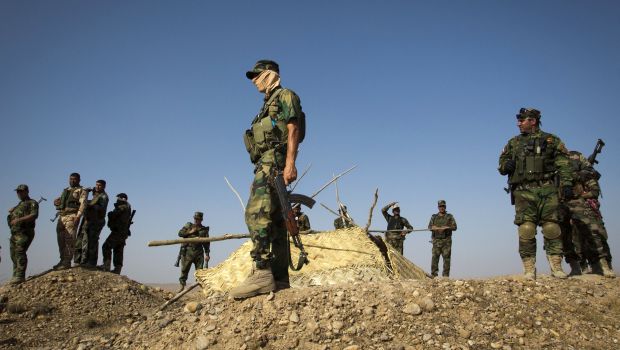
Members of Kurdish Peshmerga forces stand atop a hill during clashes with militants of the Islamic State of Iraq and Syria (ISIS) jihadist group in Jalawla in the Diyala province, on June 14, 2014. (AFP PHOTO/RICK FINDLER)
The Kurdistan Regional Government (KRG) called on Wednesday for former and retired members of its armed forces, known as the Peshmerga, to rejoin their units, in a bid to bolster the autonomous region’s military power as more of northern and western Iraq continued to slip out of government control.
The president of the KRG, Massoud Barzani, issued a statement calling on former Peshmerga to “report to the units in which they served their people and country, in order to support the Peshmerga forces and prepare for all possibilities, and therefore, the Peshmerga Ministry and leading units must take all necessary measures to organize and share the duties.”
On the same day, the autonomous region’s parliament approved the formation of a new government, nine months after regional elections left Kurdish parties wrangling over cabinet posts. The new cabinet is dominated by the three main Kurdish political parties: the Kurdistan Democratic Party (KDP), the Patriotic Union of Kurdistan (KDP) and the Gorran movement.
After taking the oath of office in the regional parliament, Prime Minister Nechervan Barzani, said: “The partners in this government will shoulder economic, financial and administrative responsibilities and will help implement all the decisions of the cabinet that will work on the trust of the people of this region.”
Barzani added: “We will follow all peaceful avenues to resolve . . . issues with Baghdad, including the issue of Kurdish areas that are outside the administrative control of the regional government, and will work on the implementation of Article 140 of the Iraqi constitution which relates to those areas, and establish a negotiating committee to resolve these issues with Baghdad.”
These developments follow the surprise advance of jihadist militants belonging to the Islamic State of Iraq and Syria (ISIS) and their allies last week, which saw Iraqi government forces abandon the northern city of Mosul and several towns and cities further south, sending shockwaves across the Middle East.
In response, Kurdish units took up positions in and around the city of Kirkuk after Iraqi army units fled in a bid to prevent ISIS advancing northwards and bolster Kurdish influence in the city, which the KRG apparently seeks to incorporate into its territory.
The Iraqi federal government, headed by Prime Minister Nuri Al-Maliki, has also scrambled to shore up its military forces in the face of the ISIS advance, including requesting US airstrikes on ISIS positions.
A plea by Iraq’s most respected Shi’ite cleric, Grand Ayatollah Ali Sistani, for volunteers to enlist in the Iraqi government forces has also brought thousands of new recruits flocking to join up.
Despite these attempts in the KRG and elsewhere to bolster public confidence, fears of further chaos and all-out sectarian war are rising across the country. In the Kurdish capital of Erbil, fuel stations were inundated with panic buyers on Wednesday, with large queues forming amid spreading fears of a looming fuel shortage.
Hamza Hamed, a spokesman for Erbil governorate, told Asharq Al-Awsat that local authorities had “decided to limit fuel supply to 30 liters of petrol per vehicle to stop people selling fuel outside the region.” He promised that the shortage problem would be resolved soon.
